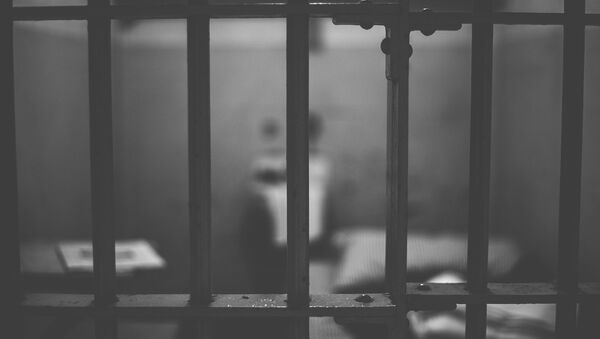To understand the tragic chain of events that led to Katie becoming mortally enmeshed in Scotland's criminal justice system, one must travel back to August 10 2017.
A popular and high-achieving student at Glasgow University, she spent the afternoon at a pub with friends — when festivities drew to a close, she made the critical error of deciding to drive home, the ciders she'd imbibed over the preceding hours putting her at over four times the drink-drive limit.
En route, her Ford Fiesta suffered a tyre-blowout, sending the car careening into a central reservation, then onto the pavement, in the process colliding with 15-year-old Michael Keenan with such force the vehicle's bumper was torn off.
The School of Geographical and Earth Sciences wishes to remember and celebrate the life of Katie Allan. She was kind, caring, and a wonderful student. She will not be forgotten. pic.twitter.com/Wn0oGXbCgK
— UofGGES (@UofGGES) June 15, 2018
After the crash, Katie sped away from the scene, leaving Michael unconscious on the gravel with blood pouring from his head, a broken ankle and fractured eye socket. She would insist she hadn't realized she'd hit the teenager until the day she died.
Witnesses gave Katie's car registration to police officers, and she was quickly tracked down at her home. When officers arrived, she appeared "upset and anxious" and immediately held her hands out so she could be handcuffed.
On February 8 2018, Katie pleaded guilty at Paisley Sheriff Court to causing serious injury by driving dangerously, over the drink-drive limit. Despite a written petition from Michael's parents she not be jailed as they didn't wish the incident "to define Katie's future", and a social enquiry report recommending her punishment be non-custodial, Sheriff David Pender said he'd no choice but to imprison Katie, and on March 28 she received a 16-month sentence.
Life Inside
Putting it mildly, prison was hell for Katie. In the words of Glasgow University chaplain Reverend Stuart McQuarrie, she was a "soft target…vulnerable from the very moment she walked into Polmont".
Her mother Linda alleges when officers took her on a tour of the prison prior to Katie's sentence commencing, they said they couldn't guarantee her daughter "wouldn't get battered" — they shrugged their shoulders when Linda asked "by prisoners or prison officers?" in response.
Such cautions reverberate unsettlingly today, for Katie was viciously bullied both verbally and physically by staff and fellow inmates alike in Polmont — frequently subject to strip searches, despite being the "last person" who would smuggle contraband, she was once forced to parade naked in front of prison staff as part of an internal training exercise.
A powerful press conference led by @AamerAnwar on Katie Allan's tragic suicide in the Scottish Prison system. Harrowing listening to Katie's unfair punishment, bullying, self-harm, hair loss, degrading strip searches. Justice must be done. https://t.co/uPHtq0v8nX #justice4katie pic.twitter.com/FQDFgWXc4U
— Ian Shaw (@ianshawz) October 25, 2018
Such was her anguish at the severe mistreatment, Katie lost 80 percent of her hair through stress-induced alopecia and began to self-harm — although jail officers neither apparently noticed, nor deemed her a suicide risk.
On June 3, Katie was visited by Linda and her younger brother Scott, for the last time. They "knew something was wrong" — on top of her hair loss, she clearly hadn't slept and looked visibly distressed and scared. She told them her repeated requests to be moved to a quieter cell had been denied, and she instead faced relocation to an even harsher adult section of Polmont.
After the meeting, Linda pleaded with staff for help, as she'd done on many occasions previously. Whether her entreaties would fall on deaf ears this time round too is moot, for Katie committed suicide mere hours later.
Reflecting on their tragic loss six months later, the hardest thing for Katie's parents to accept is how "devastatingly" she was let down by those responsible for her care.
"From the minute she was arrested, our daughter was failed. Failed by police, who didn't recognize a petrified, distraught, vulnerable young woman. Failed by the Crown office, who presented a false narrative in court. Failed by her court-appointed solicitor, who was unable to challenge the prosecution's inaccuracies, dismissed a key witness as 'unimportant' and misrepresented the seriousness of Katie's offences to her. Failed by Sheriff Pender, who absolutely did have alternatives at his disposal, especially when the Keenan family had shown such forgiveness. Most of all though, Katie was failed by the Scottish Prison Service (SPS)," Linda said in a statement passed to Sputnik.
'Change Nothing'
For its part, the SPS says it "can offer no further comment on the circumstances surrounding" Katie's death" in advance of the Fatal Accident Inquiry (FAI), with which it pledges to "fully cooperate". The SPS adds it has "absolute confidence" in HMP Polmont's Governor.
This evening in advance of the press conference @UofGlasgow on Thursday 25th October, the story of #KatieAllan on @itvnews at 6.30pm & 10pm tonight pic.twitter.com/ZjzKAhl1D2
— Aamer Anwar🎗🌹 (@AamerAnwar) October 24, 2018
FAIs are compulsory legal proceedings instigated in response to any and all fatalities that occur in Scottish prisons, in order to establish the circumstances of a death, the equivalent of an inquest.
Katie's family are likely to be waiting many years indeed for the FAI to pass judgment — in February 2017 it was revealed the deaths of 60 prisoners in Scottish jails since 2012, almost half the total number who died in custody during that five-year period, were yet to be properly investigated or explained.
Seven of the 121 inmates who'd died were women — but only the FAI of 19-year-old Sarah Mitchell, who killed herself in Cornton Vale prison May 12 2012, had been concluded by that time.
Perhaps most notably, in 2011 the 'Commission on Women Offenders', chaired by Dame Elish Angiolini, was launched in response to Scotland's female prison population more than doubling over the previous decade, despite the country's national crime rate standing at a 37-year, all-time low.
Its final report (since removed from the web) called for comprehensive upheaval of the way Scotland's female offenders were treated — along with basic internal improvements to prison regimes, such as better staff training (particularly in respect of mental health issues), intensive mentoring structures, and more purposeful activity for inmates, among other things.
While hailed as offering a "compelling vision for the future" by then-Scottish Justice Minister Kenny Macaskill, its proposals have failed to be codified legislatively since.
Again, this Neronian vacillation by officials is totally unacceptable to the Allans — and they aren't going to stand idly by while many women just like Katie remain at risk.
Battle Begins
On October 25, Katie's family launched a crowdfunding campaign, seeking financial backing for several legal challenges — in particular, to compel Holyrood to instigate an official review of the SPS, and secure immediate answers to the burning questions hanging over Katie's death.
The family of Katie Allan, who took her own life, while in prison, launch their campaign for justice. pic.twitter.com/v2BgJvJJ2T
— Suzanne Allan (@suzanneallan) October 25, 2018
They're supported in their cause by INQUEST, a charity supporting bereaved families of individuals who've died during or after contact with the criminal justice system, and noted human rights lawyer Aamer Anwar.
"Like so many other families before them, since that fateful day the Allans have come up against a seemingly impenetrable wall of secrecy and defensiveness erected by a prison system uninterested in learning lessons or accepting responsibility for its failings. They cannot wait years for the FAI to conclude — memories fade, cover ups take place, and its recommendations are not binding in any event. Sadly, Katie was not the first and will not be the last person to commit suicide in a Scottish prison — but this campaign is about producing real change," Aamer told Sputnik.
When proceedings are complete, every Ombudsman's report is published on its official website — no remotely comparable structure exists north of the border at present.
More importantly though, Aamer believes fundamental reform of the entire prison system is far more fundamental for averting future tragedies such as that which befell Katie.
"We've lost our way in Scotland. Locking people up in dungeons of despair doesn't rehabilitate anyone. A custodial sentence should only be considered by courts as a last resort for the most serious offences. Jails also need to become safer, healthier places, which promote mental and physical health. They must also be sufficiently staffed by people equipped with the right mix of skills, training and experience, who can build positive relationships with inmates and notice minute changes in their demeanour, in order to keep them safe from harm. Similarly, inmates' family members should be able to speak directly with a senior member of staff if they have concerns — and their concerns should be taken seriously and followed up," he tells Sputnik.
It's notable these shocking increases coincide with cuts to budgets, overcrowding, increase in prison violence and a deterioration in prison safety — and Aamer has been contacted privately by several prison officers who say a lack of resources has prevented them from being able to protect prisoners at risk of suicide and self-harm.
"Prison is not the right place to treat serious psychiatric conditions. A prison regime should be built around a normal life, with inmates able to occupy themselves productively, socialize and exercise and go outdoors, rather than being locked up in their cells for the majority of the day. Instead, the reality is both prisoners and staff are incarcerated in an unreal, filthy and frightening world of despair and suffering," he grimly concludes.




